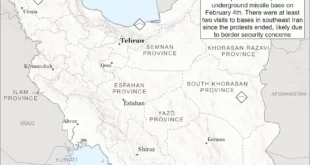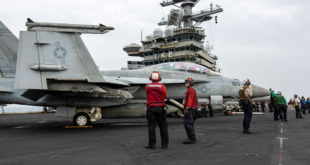 The Bush administration Friday defended its approach to Iran’s nuclear program in the face of implicit criticism from International Atomic Energy Agency director Mohammed ElBaradei. The IAEA chief suggested Washington is in a rush to use military force against Iran, while a US official said ElBaradei is engaged in unhelpful public sniping.
The Bush administration Friday defended its approach to Iran’s nuclear program in the face of implicit criticism from International Atomic Energy Agency director Mohammed ElBaradei. The IAEA chief suggested Washington is in a rush to use military force against Iran, while a US official said ElBaradei is engaged in unhelpful public sniping.
The Bush administration and ElBaradei have a history of friction dating to the run-up to the invasion of Iraq in 2003, and tensions have apparently flared up again over the Iranian nuclear program.
In widely-reported remarks in Vienna, the IAEA chief depicted US and other critics of his recent cooperation accord with Iran as back-seat drivers, and also – with Washington as his apparent target – said there are those beating war drums over the nuclear issue when diplomacy will suffice.
At a news briefing, State Department Deputy Spokesman Tom Casey said he hoped ElBaradei was not referring to the United States with the war drums remark because it would be untrue.
Casey said US policy has been, and continues to be, focused on diplomacy, and helping the IAEA and the United Nations learn the truth about Iran’s nuclear intentions.
“It would be really hard for anyone to say that the United States has been anything but at the forefront of supporting the work of the IAEA to try and resolve these issues, of working diplomatically with the IAEA, with the [IAEA] Board of Governors, with the [UN] Security Council and with the international community to come up with a resolution of this,” he said.
The Bush administration and European allies believe Iran’s peaceful nuclear program has a covert weapons component. Senior US officials have repeatedly said President Bush takes no options off the table in dealing with the matter, but is committed to a diplomatic resolution.
Recent tensions between ElBaradei and US officials have focused on the agreement he made with Tehran last month, under which Iranian authorities committed by year’s end to answer questions about the nuclear program that the IAEA has raised over the last four years.
US has said the deal is simply an attempt by Tehran to buy time and head off a new UN sanctions resolution. ElBaradei in his remarks in Vienna lashed out against so-called back-seat drivers, and said the plan will enable the IAEA by December to verify whether Iran, which denies nuclear weapons ambitions, is working in good faith.
Spokesman Casey, for his part, said the ElBaradei plan is a potentially important way to resolve past questions about the Iranian program. But he suggested the focus should be on current Iranian activities including its large-scale uranium enrichment program.
The Bush administration would like to see early action in the UN Security Council on a resolution tightening sanctions on Iran for refusing to halt enrichment.
 Eurasia Press & News
Eurasia Press & News



